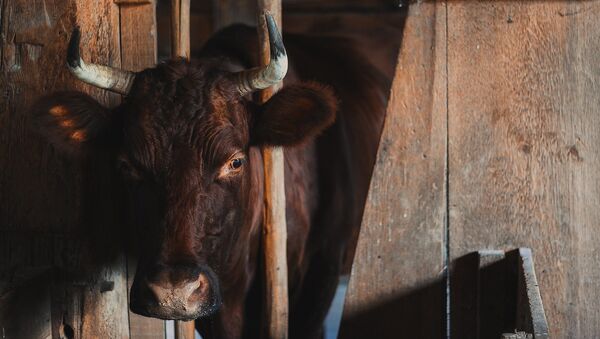Around 700 bulls and 730 bull tamers are participating in a traditional sport in Tamil Nadu, during the four-day harvest festival of Pongal.
Thirty-one participants were injured in Madurai and were admitted to Rajaji Hospital for the treatment, said Madurai Assistant Director Dr Vinod.
Madurai district will be lit today!#PongalOPongal #Jallikattu pic.twitter.com/l8ysYWieJH
— Bharath (@brakoo) January 15, 2020
The festival began on Wednesday after the Supreme Court of India dismissed a petition seeking a ban on the barbaric bull-taming event. The court said it wouldn't interfere and asked petitioners to approach the top court in the state.
#WATCH Tamil Nadu: #Jallikattu competitions continue in Madurai's Avaniyapuram. 700 bulls and 730 Bull Catchers are participating in it. pic.twitter.com/6zoaKYahdA
— ANI (@ANI) January 15, 2020
Visuals: Youngsters try to tame bulls at the Avaniapuram #Jallikattu#HappyPongal pic.twitter.com/yCpInScZRM
— TOIChennai (@TOIChennai) January 15, 2020
களைகட்டும் அவனியாபுரம் ஜல்லிக்கட்டு #Jallikattu #Madurai #Pongal #Pongal2020 #PongalFestival #PongalOPongal #பொங்கல்_திருநாள் #HappyPongal2020 #பொங்கல்நல்வாழ்த்துக்கள் pic.twitter.com/S2Ma6W6OWP
— JayaPlus (@jayapluschannel) January 15, 2020
A Barbaric Sport
Reportedly, at least 43 people and 4 bulls were killed in the Jallikattu events between 2009 and 2014 and in 2017 alone 23 people were killed and around 2,500 left injured.
Despite a large number of deaths and injuries to both humans and bulls, the festival is supported by its enthusiasts, who call intervention by the court an assault on Tamil pride. Several ministers of the state, celebrities and politicians extended their support for the protests held to revoke the ban imposed by the court in 2017.
On the contrary animal rights groups call it a “barbaric sport” and held massive protests against it. Animal rights group PETA had previously released videos showing bull farmers doping animals ahead of the event. They also claimed participants purposely try to disorient the bulls by forcing them to consume alcohol, biting their tails or even stabbing them with sharp objects.
The sport was banned in 2014 following a successful decade-long battle by animal welfare organisations. Massive protests were held in 2017 after the court rejected pleas seeking permission for the festival that year.
After more than a week’s protest, the Tamil Nadu state government allowed the festival by making an amendment to the central government’s Prevention of Cruelty to Animals Act 1960. The ban was overturned after the President of India approved the amendment, allowing the sport to be held without legal hurdles.


